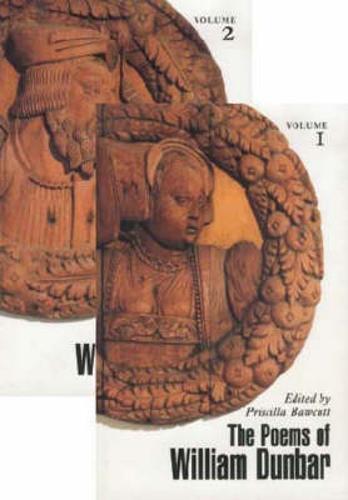
THE POEMS OF WILLIAM DUNBAR
Edited by Priscilla Bawcutt (in 2 volumes)
Hardback
ASLS, Glasgow, May 1999
Price: £30.00
ISBN 978-0-948877-38-4
WINNER of the National Library of Scotland/Saltire Society Research Book of the Year Award 1999
“This is an edition of the highest quality, the fruition of decades of reflection on this notably intractable corpus. It has been time well spent. Over a hundred and sixty years after Laing began the task we now have an edition of Dunbar that is worthy of the poet.”
— Notes and Queries
“… supplants all previous editions.”
— London Review of Books
“This more scholarly complete edition not only replaces its only serious rival; it deserves recognition as one of the finest achievements in early English textual scholarship of this generation.”
— Medium Ævum
Priscilla Bawcutt’s new edition of the poems of William Dunbar, the greatest Scottish poet of the sixteenth century, is an essential reference for all students of Scottish literature. As well as freshly established texts of every poem, this edition contains a full introduction, a complete listing of textual variants in all the early manuscripts and printings, extensive notes, a glossary and a list of sources and secondary material. Though Professor Bawcutt acknowledges her debt to previous editors, she differs from them in many ways. She has rejected late accretions to the Dunbar canon, while reinstating two problematic poems rejected by Kinsley in his 1979 edition. She has made many corrections to the transcription and interpretation of the texts, valuing the variants in manuscripts other than the Bannatyne more highly than previous editors and sometimes adopting a different copy text. One of her chief concerns has been to elucidate not just the literal sense but also the connotations of Dunbar’s words: the figurative and metaphoric uses, the legalisms, poetic archaisms, puns and other wordplay, as well as the use of proverbs, scriptural allusions and debts or affinity to earlier poets. This has taken her into many varied and unexpected areas of medieval life and thought in assembling her line-by-line commentary on every poem in the edition. Readers will find much new information about obscure words and phrases and no difficult passage is passed over silently.
These volumes are a tribute not only to the wonderful poet whose works they contain but also to the industry, erudition and acumen of his latest editor.